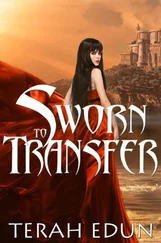'Stand guard here for me, will you?' he asked. 'In case I get stuck down there and need help to climb out.' He was unwinding a rope from around his waist, and I realised that plundering the tomb had been his intention from the moment he had suggested that he and I climb to the headland.
A moment later Grettir was lowering himself down into the black hole and I could hear his voice as he vanished into the gloom. For a moment I thought he was speaking to me, and tried to make out what he was saying. But then I realised that he was talking to himself. He was making a noise to keep up his courage, to compensate for his terror of the dark. His words, echoing up from the entrance hole into the tomb, made no sense. Then came a sudden loud crash, followed immediately by a loud yell of bravado. There was another crash, and another, and I guessed he was nailing about in the dark, floundering and tripping over one obstacle after another, falling over the grave goods in the dark, driven by his determination to carry out the robbery, yet gripped by a sense of panic.
The racket finally ended and then I heard Grettir's voice call up to me, 'Hang onto the rope! I'm ready to climb up.'
I braced on the rope and soon Grettir's head and shoulders appeared through the hole in the roof of the tomb, and he hauled himself out onto the grass. Then he turned round and began to pull on the rope, until its end appeared attached to a bundle. He had used his tunic as a sack to hold the various items he had collected. He laid them out on the grass to inspect. There were several bronze dishes, some buckles and strap ends from horse harness, a silver cup, and two silver arm rings. The finest item was a short sword which the dead man would have carried if the Valkyries selected him for a warrior's afterlife in Valholl. Grettir slid the weapon out of its sheath and in a glimmer of moonlight I could see the intricate patterns a master swordsmith had worked into the metal of the blade.
'That's a noble weapon,' I commented.
'Yes, I had to fight the haugbui for it,' Grettir replied. 'He was reluctant to give it up.'
'The mound dweller?' I asked.
'He was waiting for me, seated in the dead man's chair,' Grettir said. 'I was groping around in the darkness, gathering the grave goods, when I put my hand on his leg and he jumped to his feet and attacked me. I had to fight him in the dark, as he tried to embrace me in his death grip. But finally I managed to cut off his head and kill him. I laid him out face down, with his head between his buttocks. That way he will never live again.'
I wondered if Grettir was telling the truth. Had there really been a haugbui? Everyone knows stories about the spirits of the dead who live in the darkness of tombs, ready to protect the treasures there. Sometimes they take substantial form as draugr, the walking dead who emerge and walk the earth, and frighten men, just as the ghost of Kar the Old had scared away the local farmers. Cutting off a haugbui's head and placing it on the buttocks is the only way to lay the creature finally to rest. Or was Grettir spinning me a tale to account for the noise and clatter of his robbery, his senseless loud talk and the shouts of bravado? Was he ashamed to admit that Grettir the Strong was terrified of the dark, and that all that had happened was that he had blundered into the skeleton of Kar the Old seated on his funeral chair? For the sake of Grettir's self-esteem I did not question his tale of the barrow wight, but I knew for sure that he was more fearful of the dark than a six-year-old child.
Grettir's self-confidence and bravado were still evident the next morning when the camp awoke and he made no attempt to hide his new acquisitions. I was surprised that he even took his loot with us when we went to visit Thorfinn's farm to buy ship's stores. When Grettir brazenly laid out the grave goods on the farmhouse table, Thorfinn recognised them at once.
'Where did you find these?' he asked.
'In the tomb on the hill,' Grettir replied. 'The ghost of Kar the Old is not that fearsome after all. You'd better keep hold of them.'
Thorfinn must have known Grettir's reputation because he avoided any confrontation. 'Well, it's true that buried treasure is no use to anyone,' he said amiably. 'You have my thanks for restoring these heirlooms to us. Can I offer you some reward for your courage?'
Grettir shrugged dismissively. 'No. I have no need for such things, only for an increase to my honour, though I will keep the sword as a reminder of this day,' he said. He then rudely turned on his heel and walked out of the farmhouse, taking the fine short sword and leaving the rest of the grave goods on the table.
I mulled over that answer as I walked back to the ship, trying to understand what drove Grettir. If he had plundered the barrow in order to gain the admiration of the others for his courage, why did he behave so churlishly afterwards? Why was he always so rude and quarrelsome?
I fell into step with him. Typically, he was walking by himself, well away from the rest of our group.
'That man whose death got you outlawed from Iceland, why did you kill him?' I asked. 'Killing someone over something as trifling as a bag of food doesn't seem to be a way of gaining honour or renown.'
'It was a mistake,' Grettir replied. 'At the age of sixteen I didn't realise my own strength. I was travelling across the moors with some of my father's neighbours when I discovered that the satchel of dried food I had tied to my saddle was missing. I turned back to the place where we had stopped to rest our horses, and found someone else already searching in the grass. He said that he too had left his food bag behind. A moment later he gave a cry and held up a bag, saying that he had found what he was looking for. I went over to check and it seemed to me that the bag was mine. When I tried to take it from him, he snatched out his axe without warning and aimed a blow at me. I grabbed the axe handle, turned the blade around and struck back at him. But he lost his grip and the axe suddenly came free, so I struck him square on the skull. He died instantly.'
'Didn't you try to explain this to the others when they found out what had happened?' I asked.
'It would have done no good — there were no witnesses. Anyhow the man was dead and I was the killer,' said Grettir. 'It goes against my nature to heed the opinions of others. I don't seek either their approval or their disdain. What matters will be the reputation I leave behind me for later generations.'
He spoke so openly and with such conviction that I felt he was acknowledging a bond between us, a comradeship which had started when we pillaged the barrow together. My intuition was to prove correct, but I failed to discern that Grettir was also casting the shadow of his own downfall.
The sailors thought Grettir had been a rash fool to interfere with the spirits of the dead. All day they kept muttering among themselves that his stupidity would bring down misfortune on us. One or two Christians among them made the sign of the cross to keep off the evil eye. Their disquiet was confirmed when we got back to where we had moored the ship. In our absence a gust of wind had shifted the vessel on her anchorage and brought her broadside to the rocky beach. The anchor had lost its grip and she had been driven ashore. By the time we got back, the boat was lying canted over, stoved in, sea water swilling in her bilge. The damage to her planking was so severe that her captain decided we had no choice but to abandon the vessel and march overland to Nidaros, carrying the most valuable of our trade goods. There was nothing to do but wade out in the shallows and salvage what we could. I noticed that the sailors took care to keep as far away from Grettir as possible. They blamed him for the calamity and expected that further disaster would follow. I was the only person to walk beside him.
Читать дальше








